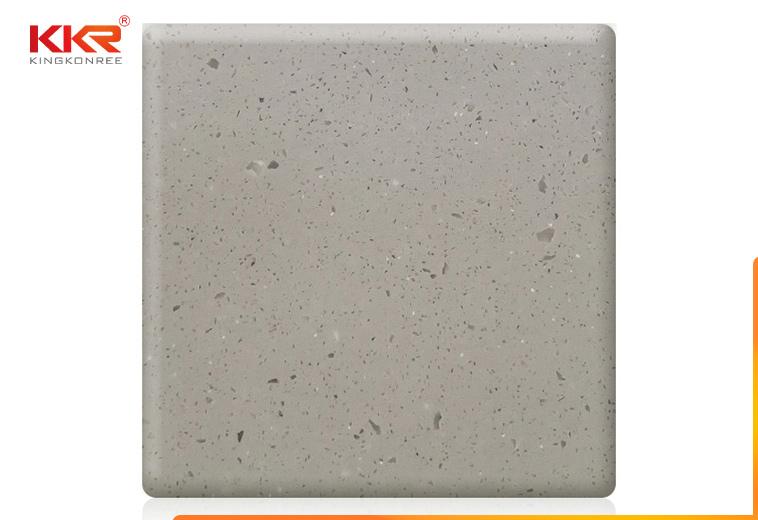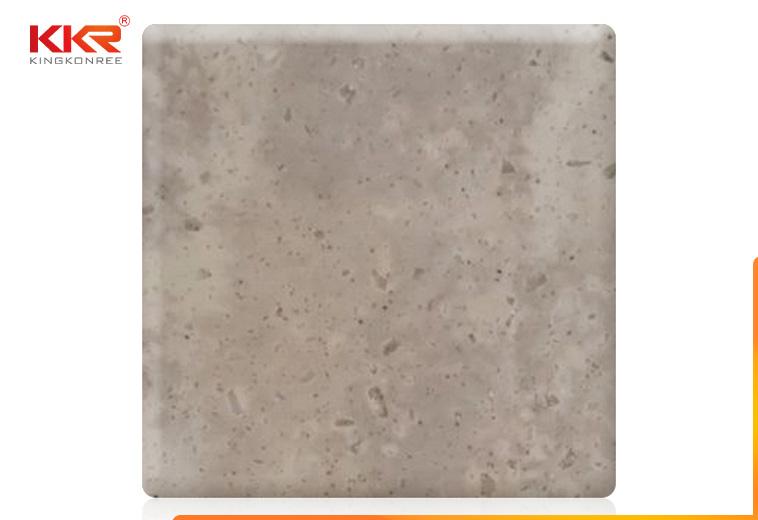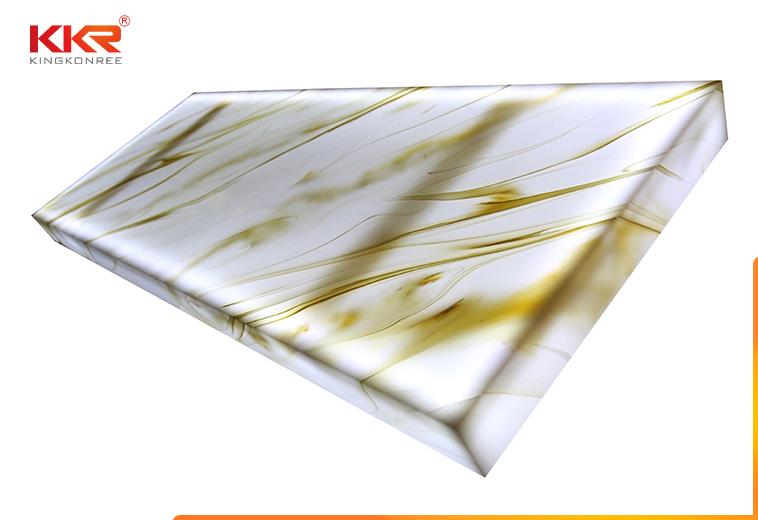When it comes to kitchen and bathroom countertops, there is a wide range of materials to choose from, including solid surface and quartz. While these two options share some similarities, they also have significant differences that can affect their appearance, durability, and maintenance requirements.
Whether you are building a new home or planning a renovation, it is important to understand the pros and cons of solid surface vs quartz countertops (Learn: How To Cut Solid Surface Countertops) to determine which one is the best fit for your needs and budget. In this article, we’ll explore the key differences between the solid surface countertop (Learn: What Is A Solid Surface Countertop) vs quartz to help you make an informed decision.
Quartz Countertops Vs Solid Surface: Materials
In terms of material makeup, here are some of the differences between solid surface countertops vs quartz:
Quartz countertops
Quartz countertops are made from a combination of natural quartz stone and resin, which is why they are sometimes referred to as engineered stone. This mixture gives them a unique appearance that can resemble the look of natural stone. They are available in a variety of colors, patterns, and textures, and can be customized to match any design preference.
Quartz countertops are extremely durable and resistant to scratches, heat, and stains. They are easy to maintain and can be cleaned with just soap and water. Unlike natural stones, they do not require regular sealing or polishing to maintain their appearance.
Solid surface countertops
Solid surface countertops (Learn: Pros and Cons of Solid Surface Countertops) are made from a mixture of acrylic or polyester resins and natural minerals, giving them a smooth and seamless appearance. They are available in a wide range of colors and patterns, and can even be made to mimic the look of natural stone or other materials.
Solid surface countertops are also highly durable and resistant to scratches, heat, and stains. They can be repaired if damaged, and scratches can be easily sanded out. They are also non-porous and do not require regular sealing or maintenance. An example of such is the KKR pure acrylic solid surface KKR-M2665.

Solid Surface Vs Quartz Countertops: Looks
In terms of aesthetics, both quartz countertops vs solid surface countertops have their differences:
Quartz countertops
Quartz countertops are known for their elegant and unique appearance, which can resemble the look of natural stone. The mixture of natural quartz stone and resin creates a distinctive texture and depth that adds a touch of sophistication to any space.
Quartz countertops are available in a wide range of colors, patterns, and textures, making them a versatile choice for any design style. They can be customized to fit specific preferences, from simple and understated to bold and dramatic. Some popular quartz countertop styles include marble-like veining, speckled patterns, and solid colors.
One of the biggest advantages of quartz countertops is their ability to mimic the look of natural stone, such as marble or granite, without the drawbacks of natural stone. For instance, quartz countertops are non-porous and therefore do not require regular sealing or polishing, unlike natural stone.
Solid surface countertops
Solid surface countertops are known for their sleek and seamless appearance. They can be made to mimic the look of various materials, including natural stone, concrete, and even wood. This versatility makes them a popular choice for modern and contemporary design styles.
Solid surface countertops are available in a wide range of colors and patterns, from neutral shades to bold and vibrant hues. They can be customized to fit specific design preferences, including custom edge profiles and integrated sinks.
KKR’s countertops come in a variety of colors and patterns; and KKR surpasses other competitors in both quantity and aesthetics, especially in black, terrazzo-looking, marble, pure white, solid, translucent, and sandy colors. In addition to the colors, KKR creates gorgeous expressions using textured patterns to make countertops visually stunning and aesthetically appealing.

Solid Surface Countertops Vs Quartz: Performance
Let’s dive into specific differences between the performance of Corian countertops vs quartz:
Heat Resistance
Quartz countertops
Quartz countertops are generally heat-resistant, but they are not immune to damage from high temperatures. Direct contact with hot pots or pans can cause quartz countertops to crack or discolor, so it is recommended to use trivets or hot pads to protect the surface.
Solid surface countertops
Solid surface countertops are less heat-resistant compared to quartz but can withstand direct heat without damage. However, it’s still recommended to use trivets or hot pads to protect the surface and prevent any potential damage from high heat exposure.
Seam Visibility
Quartz countertops
Quartz countertops are typically manufactured in larger slabs, which can make it challenging to create seamless edges in longer countertops or designs that require multiple pieces. This can result in visible seams where two pieces are joined, which may not be desirable for some homeowners.
Solid surface countertops
Solid surface countertops are more versatile in terms of seam visibility. They can be easily cut and joined to create a seamless and uniform appearance, even in larger installations. This makes them a popular choice for kitchen and bathroom countertops where a seamless look is desired. KKR has a self-made solid surface glue that makes it invisible to discover the joints. In addition, they use the same glue color as the solid surface.
Scratch Resistance
Quartz countertops
Quartz countertops are highly scratch-resistant due to the natural hardness of quartz, making them a durable choice for high-traffic areas like kitchens and bathrooms. However, while quartz is highly resistant to scratching, it is not completely scratch-proof, and sharp objects like knives can still cause scratches or nicks on the surface.
Solid surface countertops
Solid surface countertops are also highly scratch-resistant, and they can be easily repaired if scratched or damaged. Small scratches can be sanded out using fine-grit sandpaper, making them a low-maintenance and long-lasting option for homeowners.
Sealing Needs
Quartz countertops
Quartz countertops are non-porous, which means they do not require regular sealing or polishing to maintain their appearance or durability. The non-porous surface also makes quartz countertops highly resistant to stains and bacteria, which is a key advantage in high-use areas like kitchens and bathrooms.
Solid surface countertops
Solid surface countertops are also non-porous and do not require regular sealing or polishing. This makes them a low-maintenance option for homeowners who want a durable, long-lasting countertop that is easy to care for. The non-porous surface also makes them highly resistant to stains and bacteria, which is a key advantage in high-use areas like kitchens and bathrooms.
Hygiene
Quartz countertops
Quartz countertops are naturally non-porous and highly resistant to bacteria growth, making them a hygienic choice for use in the kitchen and bathroom. The non-porous surface also makes them easy to clean and maintain, as spills and stains do not penetrate the surface and can be wiped away with ease.
Solid surface countertops
Solid surface countertops are also non-porous and highly resistant to bacteria growth, making them a hygienic choice for use in the kitchen and bathroom. The non-porous surface also makes them easy to clean and maintain, as spills and stains do not penetrate the surface and can be wiped away with ease. Additionally, solid surface countertops are seamless, which means there are no cracks or crevices where bacteria can accumulate, further enhancing their hygiene properties.
Durability
Quartz countertops
Quartz countertops are highly durable and resistant to wear and tear. They are made with a combination of natural quartz and synthetic resins, which makes them incredibly strong and resistant to scratches, chips, and other types of damage. Quartz countertops are also highly resistant to heat, staining, and bacteria growth, which enhances their overall durability and longevity.
Solid surface countertops
Solid surface countertops are also highly durable and resistant to wear and tear. They are made with a mixture of natural minerals and acrylic polymers, which makes them strong and resistant to scratches, stains, and impact damage. Solid surface countertops are also highly customizable, which allows for repairs or modifications to be made as needed. This versatility and durability make solid surface countertops a popular choice for both residential and commercial settings.
Maintenance
Quartz countertops
Quartz countertops are easy to maintain and do not require any special cleaning products or procedures. They can be easily cleaned with a mild soap and water solution, and spills or stains can be quickly wiped away. Quartz countertops are also highly resistant to bacteria growth and staining, which makes them a low-maintenance option for busy households.
Solid surface countertops
Solid surface countertops are also easy to maintain and can be cleaned with a mild soap and water solution. Unlike natural stone countertops, solid surface countertops do not require any special sealing or polishing. They are highly resistant to bacteria growth and staining, which makes them a low-maintenance option for busy households. Additionally, any scratches or nicks that do occur can be easily repaired using sandpaper or a polishing compound.
Cost
Now, let us consider the cost of Corian vs quartz countertops:
Quartz countertops
Quartz countertops tend to be more expensive than some other countertop materials, such as laminate or tile. However, the price can vary depending on factors such as the quality of the quartz used, the size of the countertop, and the complexity of the installation. On average, quartz countertops cost between $50- 150 per square foot (installation inclusive).
Solid surface countertops
Solid surface countertops tend to be less expensive than quartz, making them a more affordable option for homeowners on a budget. The cost can vary depending on factors such as the size of the countertop and the complexity of the installation, but on average, solid surface countertops cost between $40 and $100 per square foot, including installation. Overall, solid surface countertops offer a cost-effective solution that still provides durability and a high-end look.
Solid Surface Vs Quartz countertops: Installation
In terms of installation, corian countertop vs quartz are different, let us go into greater detail:
Quartz countertops
The installation process for quartz countertops (Learn: Step-by-Step Process of Templating Countertops) is relatively straightforward but can be more involved than other materials due to their weight and density. Before installation, the countertop area must be measured and templated to ensure an accurate fit.
Once the quartz slabs are cut to size and polished, they are transported to the installation site. During installation, the countertop must be carefully maneuvered into place and secured to the cabinets using screws or adhesive. Any seams between the slabs are then filled and sanded down to create a smooth, seamless finish.
Solid surface countertops
The installation process for the solid surface like the KKR Solid Surface Pure Translucent Solid Surface Sheet KKR-A025 countertops is similar to that of quartz but can be easier due to their lighter weight and more flexible nature. Like with quartz, the countertop area must be measured and templated before installation.
The solid surface material is then cut to size, and any seams are joined using an adhesive that is color-matched to the countertop material. The solid surface countertop is then secured to the cabinets using screws, and any edges or corners are sanded down and polished to create a smooth finish.

Solid Surface Countertops Vs Quartz
In summary, here is a table showing the comparison between solid surface vs quartz countertops across different categories:
| Category | Quartz Countertops | Solid Surface Countertops |
| Installation | Requires professional installation due to weight and density. Can be more involved than other materials. | Requires professional installation but can be easier due to its lighter weight and flexibility. |
| Cost | More expensive than some other materials, averaging between $50-$150 per sq ft. | Less expensive than quartz, averaging between $40-$100 per sq ft. |
| Maintenance | Low maintenance, requiring only regular cleaning with soap and water. Stains can be removed with mild cleaners or a paste of baking soda and water. | Low maintenance, requiring only regular cleaning with soap and water. Scratches and chips can be sanded out by a professional. |
| Durability | Highly durable and resistant to scratches, stains, and heat. Can last for many years without showing signs of wear. | Durable but can be more susceptible to scratches, stains, and heat damage than quartz. |
| Hygiene | The non-porous surface resists bacteria and germs, making it a more hygienic choice for kitchens and bathrooms. | The non-porous surface resists bacteria and germs, making it a more hygienic choice for kitchens and bathrooms. |
| Sealing Needs | Does not require sealing, as the material is non-porous and resists stains and bacteria. | Does not require sealing, as the material is non-porous and resists stains and bacteria. |
| Scratch Resistance | Highly resistant to scratches and chips, but not completely scratch-proof. | Resistant to scratches and chips, but can be more susceptible to damage than quartz. |
| Seam Visibility | Can be more visible due to the density and pattern of the material. Seams can be filled and sanded to create a smooth finish. | Seams can be more visible due to the nature of the material but can be joined using an adhesive that is color-matched to the countertop. |
| Heat Resistance | Resistant to heat and can withstand hot pots and pans, but not completely heat-proof. | Resistant to heat, but can be more susceptible to damage than quartz. |
In summary, both quartz vs solid surface countertops have their unique advantages and disadvantages, and the final decision will depend on the homeowner’s individual needs and preferences. Quartz is a more durable and heat-resistant material, but it is also more expensive. Solid Surface is a more affordable option that is easy to install and maintain, but it is less durable than quartz and can be more susceptible to scratches and heat damage.
Choosing the right Countertops
In conclusion, choosing the right countertops depends on your needs and preferences. Both quartz vs corian countertops (or solid surfaces) has their advantages and disadvantages. When choosing the right countertops, consider the following factors: your budget, design preferences, maintenance requirements, durability, hygiene, and installation process. If you want a highly durable and low-maintenance countertop, quartz is an excellent choice.
On the other hand, if you prefer a seamless look and are willing to invest in regular maintenance, solid surface countertops might be the better option. Ultimately, the right choice will depend on your circumstances, so take the time to consider your options and choose the quartz vs corian countertop that meets your specific needs.



